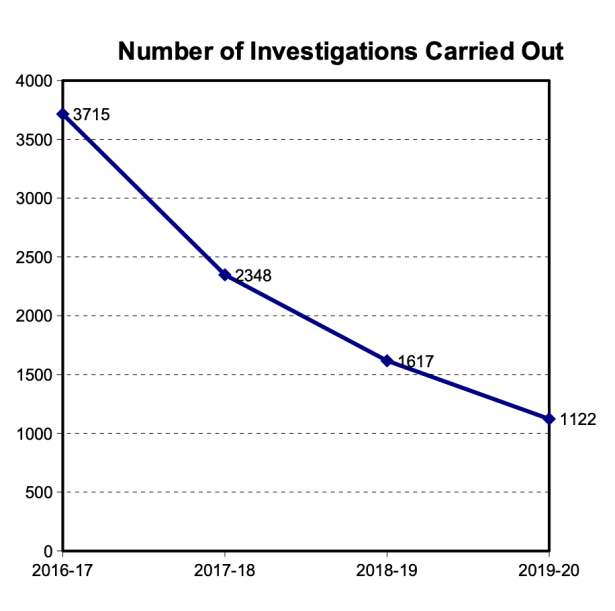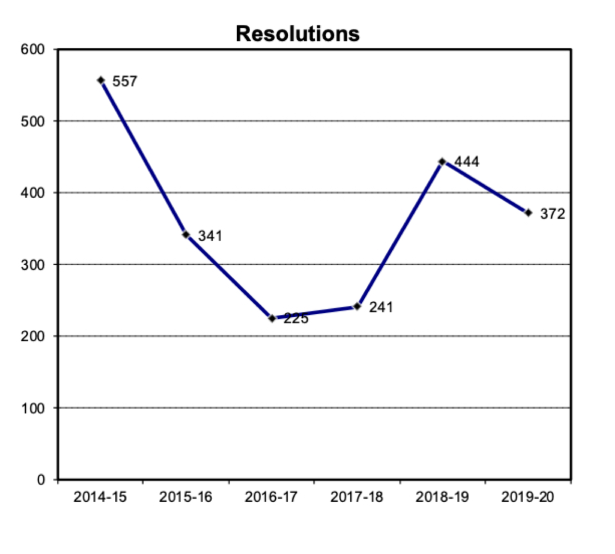In October 2020 members of PHSOtheFACTS wrote to the PHSO Governing body. We are now just one month away from the completion of Rob Behren’s three-year strategy. Investigations, assessments, and upholds have all taken a nosedive under his watch. We are calling upon the Governing Body to hold the Ombudsman to account. Since the letters were sent to each member of the Governing Body, plus members of the PHSO Expert Panel, not a single word has been heard. Are the Governing Body complicit in the failure of the Ombudsman to deliver justice and remedy to the public?
Letter to the PHSO Board from PHSOtheFACTS
Dear Board of Governors,
As you are no doubt aware, the core role of the Parliamentary and Health Service Ombudsman is to, “…provide an independent complaint handling service for complaints that have not been resolved by the NHS in England and UK government departments.” You will also be aware that as board members you have a pivotal role in ensuring that the Ombudsman delivers on this role and on his promise to provide an ‘exemplary’ service according to the agreed strategic aims.
The purpose of the Board is to make collective decisions on the strategic direction and performance of the PHSO service.
Responsibilities
To deliver its role, the Board will focus on:
- Strategy, planning and policy
- Development of the organisation to deliver its strategic aims
- Governance, including risk and assurance
- Performance, including financial, service quality, and operations who we are/board
The strategic aims have been set out in the 2018 strategy. Our strategy 2018 -2021
To be an exemplary public services ombudsman by providing an independent, impartial and fair complaints resolution service, while using our casework to help raise standards and improve public services. p6
Investigating and resolving individual complaints is a key part of our role as a public services ombudsman, but our powers also allow us to shine a light on complaints across organisations, systems and sectors. p6
Our aim is to deliver a consistent, high quality, ombudsman service that makes fair, final decisions for both complainants and the organisations we investigate.
People who bring their complaints to us expect to have them taken seriously, to be listened to and treated with respect, and to be dealt with fairly and in a timely fashion. p12
Therefore, by the end of 2020-21, we aim to:
- Make quicker decisions on our casework (demonstrated through published data)
- Improve the quality of our casework (illustrated through a balanced scorecard approach, linking casework process, outcomes and feedback)
- Improve the perception and experience of our service by complainants who come to us (demonstrated through increases in our Service Charter scores)
- Improve the perception and experience of our service by the organisations we investigate (through increases in the scores of a new annual stakeholder survey)
- Demonstrate the impact and value for money of our service on the wider public services (with a measure developed through a research project looking at measuring the wider impact of our work)
- Make our service as accessible as possible (through greater analysis of who uses our service and addressing any potential barriers complainants face)
Members of PHSOtheFACTS and other interested parties are requesting that as we are now just 6 months from the completion of the 3-year strategic plan, the board carry out a review of PHSO achievements with consideration to the following data (which has been taken from PHSO annual reports). The data record begins at the hand over to Mr Behrens in April 2017, so is an accurate measure of his leadership performance.
Every year approximately 30,000 complaints are handled by the PHSO. In 2019-20 that number was 30,895 complaints handled. These statistics show the year by year reduction in the number of investigations, assessments and upholds of complaints under the current Ombudsman.
- A 70% reduction in the number of investigations completed under the current Ombudsman. 3.6% of complaints were investigated in 2019-20.

- A 36% reduction in the number of assessments carried out under the current Ombudsman. 17% of complaints were assessed in 2019-20.

- A 58% reduction in the number of complaints upheld under the current Ombudsman. 2.1% of complaints were upheld in 2019-20.

As you can see, services to the public have decreased across the board since the arrival of Mr Behrens. In what way does this data demonstrate the achievement of the strategic aims as set out in 2018?
It could possibly be argued that ‘quicker decisions’ are made as on page 35 of the 2019-20 Annual report PHSO is proud to announce that the number of complaints closed by the helpline in 7 days has risen to 96%. Could the board confirm that just 4% of complaints benefited from an assessment by a caseworker before a decision on whether to investigate was made, with due reference to the PHSO classification of complaint v enquiry?
“We describe an enquiry as a complaint when we have looked at it in more detail and think it may be something we can help with.” 2018/19 Annual Report p.26

You will be aware that William Wragg MP, Chair of PACAC, recently wrote to the Chancellor, Rishi Sunak confirming the importance of the Ombudsman’s work to the public. PACAC letter to the Chancellor 22.9.20

The closure of more cases more quickly will have caused additional distress and suffering. Why was so little help given to so many people? If the reason for the lower assessment/investigation rate is financial, then the board are in the perfect position to analyse PHSO spending to determine why funds have not been sufficient to deliver on the core activity of the Ombudsman service, which is to investigate complaints from the public.
This sorry state of affairs was recently reported by academic Bruce Newsome in The Critic healthcare needs an ombudsman Are the board aware there is public disquiet over the large number of cases which are dismissed without proper scrutiny? Complaint handling in public services, particularly the NHS, is widely accepted to be failing the public.
Can the board explain why so few complaints meet the criteria for assessment and investigation given the serious nature of NHS complaints? In what way does this denial of remedy for so many make this service ‘exemplary’?
It might be argued that more people have benefitted from ‘early resolution’. It is unclear exactly what ‘resolution’ consists of (is a report written, are sanctions applied to the public body?) In any event, the number of resolutions is also moderate and has not seen steady improvement. In fact, the current Ombudsman service is still a long way behind previous performance levels with regard to early resolution.

In what respect is the Ombudsman service ‘as accessible as possible’ when so many are dismissed at the first stage?
Since the publication of our book ‘What’s the point of the Ombudsman?’ it can be seen in the 5-star reviewsthat the ‘perception and experience’ of the Ombudsman service has not improved under Mr Behrens, no doubt compounded by the decreasing uphold rate.

Mr Behrens is keen to point out that PHSO do more than investigate individual complaints and that the Ombudsman’s wider impact reviews contribute to improving public services, particularly patient safety. However, when we turn to ‘impact and value for money on the wider public services’ it would appear from a recent statement by Jeremy Hunt, Chair of the Health and Social Care Select Committee that patient safety issues in the NHS are not improving but increasing at an alarming rate.
Stat of the week…the NHS has spent £200m on clinical negligence claims related to medication error over the last 15 years. Worryingly the amount spent has doubled in the last six years. Patient Safety Watch October 2020
As governors, you are in a unique position to hold the Ombudsman to account over the promises made in the strategic plan. You have a moral obligation to do so. Patient safety is vital. We would appreciate a full response to our concerns once a board review has been completed. Please email your response to phso-thefacts@outlook.com
Della Reynolds
Coordinator
PHSOtheFACTS
14.10.20
cc. Bill Kirkup
James Titcombe
Nick Coleman
Suzy Ashworth


More nodding than communicating with the public, I think.
Remember Rob Behrens making a big thing at the last PACAC Scrutiny hearing about the ‘challenge’ the Expert Advisory Panel would provide? Seems it’s nothing but a lap dog:
‘2.3 Bill Kirkup queried the scope of challenge that EAP is able to provide. Rob Behrens clarified that he would have ‘final say’ on issues that EAP provides challenge on due to the Ombudsman’s legal status as Corporation Sole. ‘
3.6 Rob Behrens emphasised the ‘light touch’ nature of the panel and the intention not to meet often. He also intends for members to have the opportunity to meet with the PHSO Board.
https://www.whatdotheyknow.com/request/718796/response/1749880/attach/html/3/2019.11.26%20EAP%20Meeting%20minutes.pdf.html
Given that Rob Behrens has the ‘final say’ on EAP issues and chairs the Board, I think his ideas will prevail. Everyone will keep nodding.
And you are right Brenda. The fact they would be good automatically rules them out.
LikeLike
The EAP were also sent a letter. Silence is all that came back.
LikeLike
A silly question Jeff but worth asking them?
There are a few members of The Facts who would make excellent board members, not that they would be appointed. Worth an application though….
LikeLike
PHSO is seeking a non-executive board member. Maybe someone who will listen, though I wouldn’t hold my breath. It pays £10,000 a year:
‘With excellent communication and interpersonal skills, you will be someone who enjoys making a genuinely influential contribution to organisations. You will share our commitment to a collaborative approach and help us shape our strategic thinking as we navigate these unprecedented circumstances and move towards a brand new three-year plan.’
https://www.ombudsman.org.uk/about-us/jobs-and-careers/current-jobs/non-executive-board-member
Who is the independent person who chairs the Board? Silly question.
Click to access Board_Minutes_1_October_2020.pdf
LikeLike
Excellent communication skills obviously don’t include communicating with the public.
LikeLike
I was thinking the call for “excellent communication and interpersonal skills, you will be someone who enjoys making a genuinely influential contribution….” might be a new direction for the PHSO, since I have yet to see it practised once you’re hooked into the ‘expectations’ of the whole corrupt process.
LikeLike
‘PHSO is a total swiz.’
An organisation which points out:
https://www.whatdotheyknow.com/request/expert_advisory_panel#comment-96519
‘6.12
There is a weak correlation between the level of complainant anger about a complaint and its safety implications and we should be wary of this.’
One tactic for dismissing legitimate anger.
LikeLike
And more to the point, of those PHSO “investigate” why is there such a shockingly low uphold rate, why are so many people denied justice or remedy. PHSO is a total swiz. A fraudulent misuse of the public purse. They are corrupt, it’s not simply ineptitude or failing to investigate so many, they lie and cover-up for public bodies.
LikeLike
‘No complaints investigated = No problems’
And no service provided = no service complaints
Number of service complaints received:
2017/18 – 1013
2018/19 – 212
2019/20 – 122
https://www.whatdotheyknow.com/request/great_fall_in_service_complaints#comment-95915
LikeLike
Spot on Jeff
LikeLike
Rob Behrens, the Ombudsman, broke off communications with PHSOthefacts in 2017 just one month after inviting us to his Millbank Tower offices to ‘hear our concerns’. He obviously didn’t like the criticisms he heard about PHSO investigations. Rather than take them on board he has, during his tenure as Ombudsman, successfully steered the PHSO ship along the same route whilst dumping the cargo of complaints overboard at the same time. No doubt his political masters are delighted with his efforts. No complaints investigated = No problems
For me, the failure of the Board to respond is just a lack of basic manners – something which seems to have become the ‘norm’ today. These are vital questions relating to Government administration and safety of patients served by the NHS.
Mr.Gove at the Cabinet Office has told the Public Administration and Constitutional Affairs Committee (PACAC) there are no plans to overhaul the system. If the Board can’t answer legitimate questions their own effectiveness is seriously in question.
It is time for them to wake up and realise that silence will never drive away the criticism
LikeLike
I don’t think the Board really understand what they should be doing. If PHSO was a charity the Charity Commission would be investigating them for not adhering to their charitable aims.
In the case of PHSO, not adhering to their charter and a fair and balanced hearing of all the evidence. They would also be closed down for poor financial competence of money given to them by the public.
I once asked Sir John Shortridge to help me, he said he couldn’t interfere with how PHSO was run!!!!!! He had to leave it to the professional employed….(Thanks for nothing John)
Anyone thinking of going to the PHSO needs to read ‘What’s the Point of the Ombudsman’ before doing so. It will save you being told, when they reject your case, that you are only unhappy with the decision because you don’t agree with it.
It will be nothing to do with closing cases in 7 days….! How can an evaluation even begin in that time as PHSO will not have been able to see what the complained about authority have to say. It will be nothing to do with the fact that out of about 30,000 complaints a year, only about 2% will be upheld.
Well never mind…it’s not their families or loved ones who have asked for a fair hearing…
No wonder litigation is at an all time high, what else can people in search of fair answers do?
LikeLike